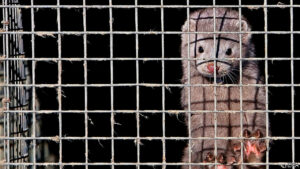 An unexpected win for animal-rights activists
An unexpected win for animal-rights activists
Animal-rights activists often complain that cute beasts get more sympathy than equally deserving ugly ones. If so, one would think a cuddly critter like the mink would be easy to protect. Yet in the Netherlands, mink are the only animal that can still legally be farmed for their fur. That is about to change. On August 28th the government brought forward to March a ban on mink-farming that had been scheduled to take effect in 2024. The timetable was sped up not because mink had become more adorable, but because they can contract covid-19 and spread it to humans.
Dutch farmers normally raise about 2.5m mink a year, making the Netherlands the world’s fourth-largest producer after Denmark, China and Poland. In April a clutch of mink and the farm hands who tended them were diagnosed with covid-19. Genetic tracing showed that at least two workers had probably been infected by mink, rather than the other way around. The contaminated animals were destroyed and stricter hygiene rules imposed, but by summer the virus had spread to a third of the country’s farms. In June parliament voted to shut down the industry as soon as possible, and the cabinet agreed.

